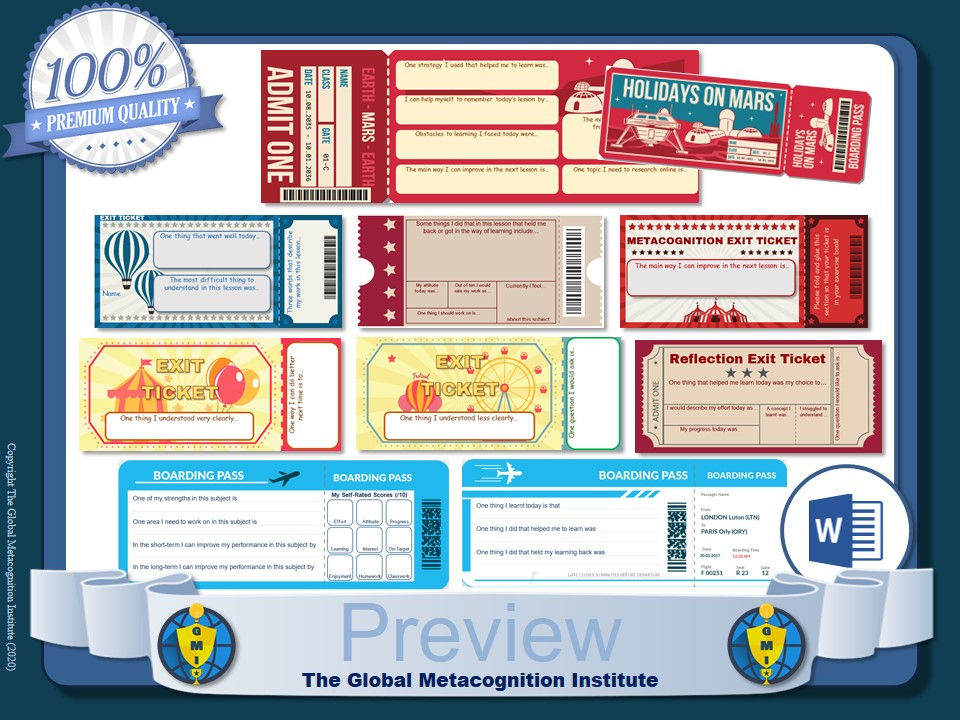For many students the final run-up to exams is now underway: it is a time of year where students and teachers push their capacities to the limit as students prepare for their final public exams.
Developing students’ capacity for self-regulated learning has never been so important, especially given that most students will have some kind of revision leave closer to their exams. Likewise, metacognition (awareness and understanding of thought and thinking), whilst best cultivated over time, can serve as a powerful intervention; the exam season provides a context high in pressure and ripe with motivation in which students can take their thinking to new levels and push their capacities to a climax – it’s a great time to be instilling metacognitive strategies that will stay with them forever.
Whilst there are a host of ways metacognition and self-regulated learning can be applied to the challenges of exam preparation: this article outlines five straight-forward ones you might consider using this year.
1) Use Exam Wrappers for Practice Assessments
Exam-wrappers are student reflection activities that take place before and after sitting a practice exam paper or assessment. Using exam wrappers is a well-established and well-evidenced metacognitive strategy: before an assessment they encourage students to reflect on how well they have prepared for the assessment, what their previous targets are, and other aspects of their readiness whilst after an assessment they encourage students to analyse and evaluate performance whilst setting new goals and targets.
You download some high-quality assessment wrappers: click here to have a look.
2) Guide Students towards Self-Regulated Revision Strategies
All students need a long-term revision strategy in order to make their revision as effective as possible: the accuracy and usefulness of the strategy they devise depends on their capacity to evaluate current levels of knowledge and develop effective learning-processes to overcome deficits.
Use of Personal Learning Checklists (PLCs) is a great way to help students organise and plan their revision strategy. Such lists are comprised of a list of all the topics students need to know about and a self-evaluation grid so that students can rate their current levels of confidence for each topic.
PLCs are a great starting point but they are not sufficient in and of themselves. Students need to be guided into deeper reflections about:
a) The timing/schedule of their revision strategy
b) Which revision activities actually help them and which are a waste of time
c) Obstacles they face and how to overcome them
d) How to build on the strengths as learners and mediate their weaknesses
We've made some PLC templates with integrated reflection tasks: click here to have a look. You might consider using our ‘Revision Strategy Battle Planner’ which tries to take all of these factors into account; it’s a short work-booklet that helps students to devise a revision strategy for a given subject.
3) Students Need to Reflect on How Lifestyle Choices Impact Their Performance
Self-Regulated learning can refer to the regulation of broader aspects of students’ lives when those aspects impact their ability to learn. Self-regulated learning implies students ‘taking control of their learning journey’ and an important aspect of this is students taking control of the factors that limit their ability to learn (or express learning in exams!).
Your school’s PSHE (Health) should spend time in the coming months directly referring to self-regulation and how different lifestyle choices and impact both the effectiveness of learning/revision as well as the students’ capacity to succeed in exams. Obvious focuses might include:
· Sleep patterns
· Stress management & emotional regulation
· Mental health maintenance
· Hydration and diet
Less obvious factors students might benefit from reflecting on include social-media and video-game use (and addiction): students should be helped to find a useful balance between revision and social-media/gaming.
We made some useful resources to help students reflect about how healthy living can impact learning power: click here to have a look.
4) Develop 'The Metacognitive Cycle' in the Minds of Students
Metacognition is the awareness and understanding of one’s thoughts and thinking-processes, most models of metacognition (and self-regulated learning more generally) propose a cyclical model for understanding the concept; claiming, for example, that metacognition should be a continual cycle of planning, monitoring, evaluating & regulating one’s approach to learning.
For example, if a student has been given a new task they might ask themselves the following questions:
· “What’s the best way to think about this challenge?” [Planning]
· “Is my current strategy helping me to learn?” [Monitoring]
· “What were the strengths & weaknesses of my strategy?” [Evaluation]
· “What do I need to change in order to improve learning?” [Regulation]
This style of self-questioning, structured according to the cyclical model, is what we are hoping to inculcate in our students. In the context of revision such questioning is essential in students refining their revision strategies and making the most out of their revision time; in the context of exams, the metacognitive cycle allows students to adapt to new and unexpected challenges having been equipped with the cognitive skills to respond to them effectively.
5) Teach Mindfulness & Meditation to Foster Emotional Self-Regulation
An underestimated aspect of self-regulated learning is the self-regulation of emotions that can enhance or disrupt learning. It is now fairly established that, while a degree of stress can motivate us, too much stress has a negative impact on performance and (more importantly) mental health.
Teaching students the knowledge and skill to help monitor, evaluate and regulate their own emotional states is a precious gift that we can share. There are a number of things students can do to help regulate their emotions: regular cardio-vascular exercise is one of the most important. Another (perhaps more classroom friendly) approach involves teaching psychological techniques such as mindfulness and meditation.
We’ve made this set of resources to teach different approaches to meditation in the classroom whilst linking them to issues around metacognition and self-regulated learning: click here to have a look.
















































Opmerkingen